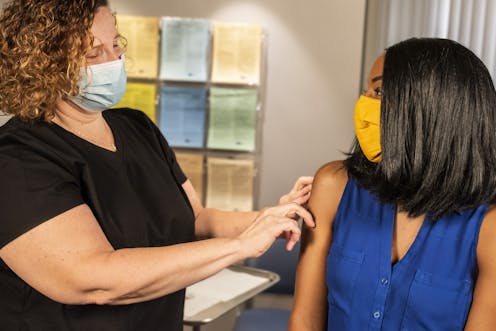Should I get my COVID vaccine booster? Yes, it increases protection against COVID, including Omicron
- Written by Cyra Patel, Senior Research Officer, National Centre for Immunisation Research and Surveillance; PhD candidate, Australian National University

If it’s been six months since you got the second COVID vaccine dose, it’s time to book in for your booster shot. This will provide additional protection against COVID, including the new Omicron variant.
While the evidence is still emerging, preliminary data suggests[1] a Pfizer booster might give the same protection against Omicron as double-dose vaccination did for the original strain.
Why get a booster?
When you get your first dose of COVID vaccine, your body produces an immune response against a part of the virus called the spike protein. If you’re exposed to the SARS-CoV-2 virus, your immune system can recognise and fight the virus quickly.
The immune response to a single dose of COVID vaccine is generally short-lived. So a second dose is needed to have a stronger and longer-lasting response.
Over time, the amount of antibodies in your body decreases – this is referred to as waning immunity.
If the immune response wanes below the level needed for protection against COVID – the “protective threshold” – your immune system may not be able to prevent infection when exposed to the virus.
Vaccine doses given some time after the initial course help boost the level of antibodies above the protective threshold.
In Israel[13], people who received a booster dose (five or more months after completing vaccination) had infection rates ten times lower than in people who had only received the initial two-dose course.
From a safety perspective, the types and frequency of side effects after the booster dose[14] have been similar to first and second doses.
















